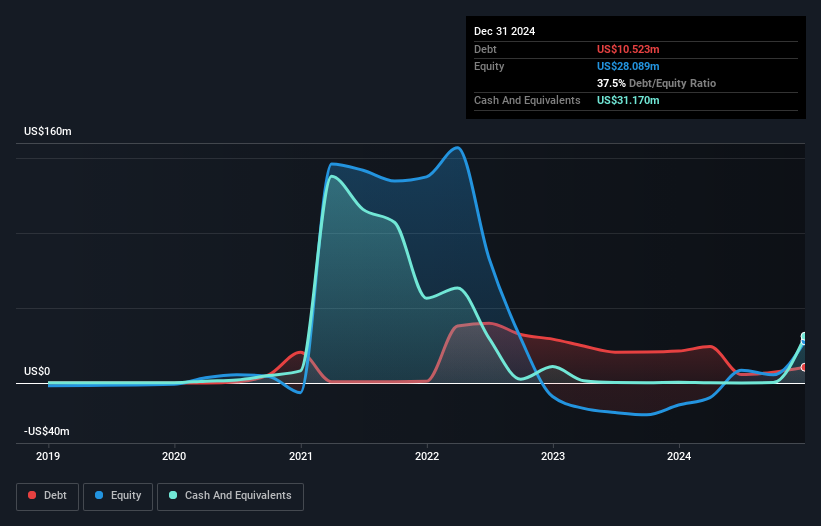The external fund manager backed by Berkshire Hathaway's Charlie Munger, Li Lu, makes no bones about it when he says 'The biggest investment risk is not the volatility of prices, but whether you will suffer a permanent loss of capital.' It's only natural to consider a company's balance sheet when you examine how risky it is, since debt is often involved when a business collapses. We can see that Agrify Corporation (NASDAQ:AGFY) does use debt in its business. But should shareholders be worried about its use of debt?
What Risk Does Debt Bring?
Generally speaking, debt only becomes a real problem when a company can't easily pay it off, either by raising capital or with its own cash flow. If things get really bad, the lenders can take control of the business. While that is not too common, we often do see indebted companies permanently diluting shareholders because lenders force them to raise capital at a distressed price. By replacing dilution, though, debt can be an extremely good tool for businesses that need capital to invest in growth at high rates of return. The first step when considering a company's debt levels is to consider its cash and debt together.
How Much Debt Does Agrify Carry?
The image below, which you can click on for greater detail, shows that Agrify had debt of US$10.5m at the end of December 2024, a reduction from US$21.3m over a year. But on the other hand it also has US$31.2m in cash, leading to a US$20.6m net cash position.

How Strong Is Agrify's Balance Sheet?
The latest balance sheet data shows that Agrify had liabilities of US$24.7m due within a year, and liabilities of US$1.25m falling due after that. On the other hand, it had cash of US$31.2m and US$585.0k worth of receivables due within a year. So it can boast US$5.82m more liquid assets than total liabilities.
This surplus suggests that Agrify is using debt in a way that is appears to be both safe and conservative. Due to its strong net asset position, it is not likely to face issues with its lenders. Succinctly put, Agrify boasts net cash, so it's fair to say it does not have a heavy debt load! There's no doubt that we learn most about debt from the balance sheet. But it is Agrify's earnings that will influence how the balance sheet holds up in the future. So if you're keen to discover more about its earnings, it might be worth checking out this graph of its long term earnings trend.
See our latest analysis for Agrify
Over 12 months, Agrify made a loss at the EBIT level, and saw its revenue drop to US$9.7m, which is a fall of 36%. That makes us nervous, to say the least.
So How Risky Is Agrify?
Statistically speaking companies that lose money are riskier than those that make money. And in the last year Agrify had an earnings before interest and tax (EBIT) loss, truth be told. And over the same period it saw negative free cash outflow of US$12m and booked a US$28m accounting loss. But the saving grace is the US$20.6m on the balance sheet. That means it could keep spending at its current rate for more than two years. Even though its balance sheet seems sufficiently liquid, debt always makes us a little nervous if a company doesn't produce free cash flow regularly. When analysing debt levels, the balance sheet is the obvious place to start. However, not all investment risk resides within the balance sheet - far from it. For example, we've discovered 4 warning signs for Agrify (3 can't be ignored!) that you should be aware of before investing here.
When all is said and done, sometimes its easier to focus on companies that don't even need debt. Readers can access a list of growth stocks with zero net debt 100% free, right now.
New: AI Stock Screener & Alerts
Our new AI Stock Screener scans the market every day to uncover opportunities.
• Dividend Powerhouses (3%+ Yield)
• Undervalued Small Caps with Insider Buying
• High growth Tech and AI Companies
Or build your own from over 50 metrics.
Have feedback on this article? Concerned about the content? Get in touch with us directly. Alternatively, email editorial-team (at) simplywallst.com.
This article by Simply Wall St is general in nature. We provide commentary based on historical data and analyst forecasts only using an unbiased methodology and our articles are not intended to be financial advice. It does not constitute a recommendation to buy or sell any stock, and does not take account of your objectives, or your financial situation. We aim to bring you long-term focused analysis driven by fundamental data. Note that our analysis may not factor in the latest price-sensitive company announcements or qualitative material. Simply Wall St has no position in any stocks mentioned.
About NasdaqCM:RYM
RYTHM
Provides solutions for the cannabis and hemp industry in the United States.
Excellent balance sheet with moderate risk.
Similar Companies
Market Insights
Community Narratives




